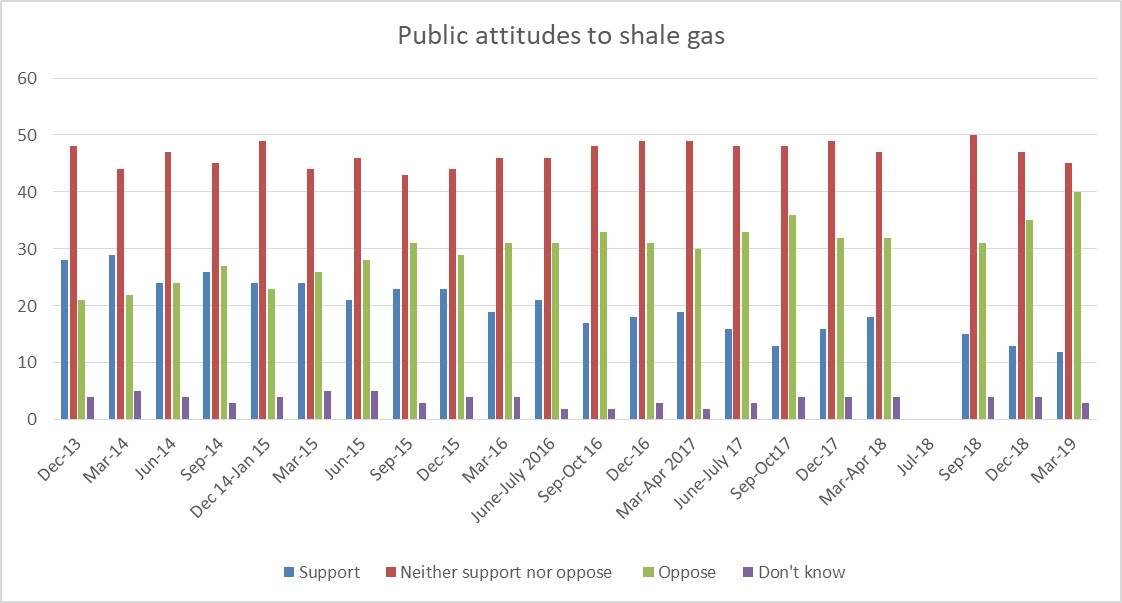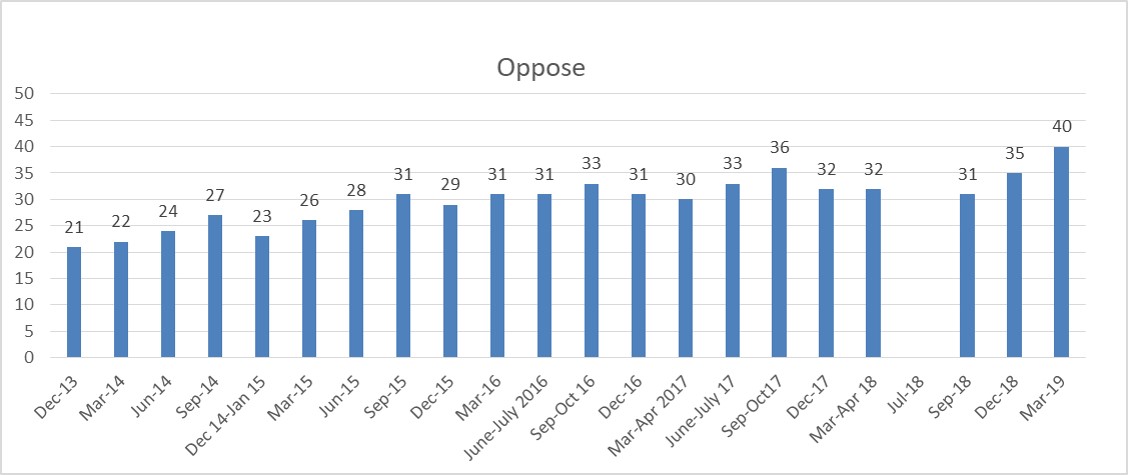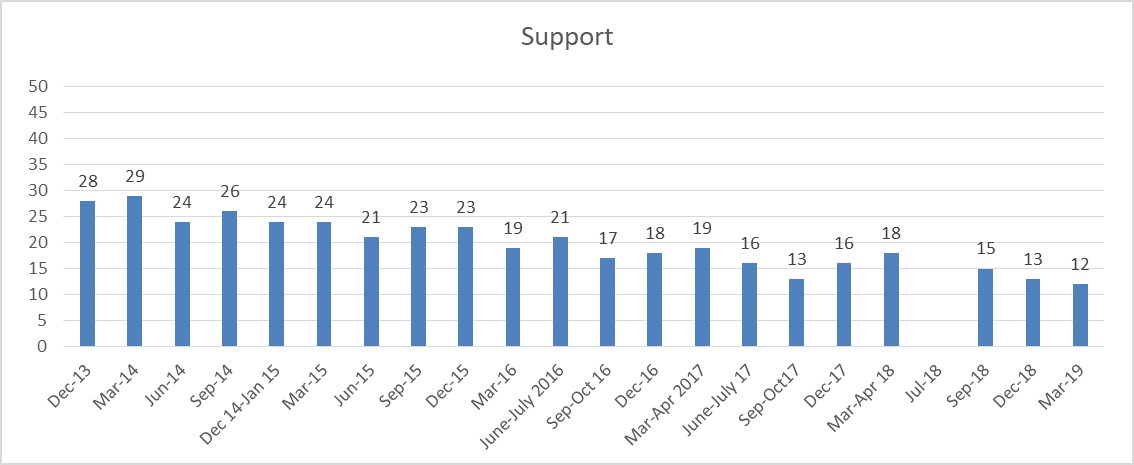By Ruth Hayhurst for Drill or Drop
Results from the latest government survey on fracking shows that public opposition has risen to its highest level so far and support dropped to a record low.
The quarterly Wave tracker survey indicates that opponents regard fracking as a risky or unsafe process and are concerned about earthquakes and the impact on climate change.
The survey was conducted in March 2019 at a time when the shale gas industry was calling for a relaxation of regulations on fracking-induced earth tremors. There were also continuing discussions about government proposals to make non-fracking shale gas schemes permitted development, avoiding the formal planning process.
Opposition
According to the latest results, 40 percent of participants opposed fracking, up from 35 percent in the most recent survey conducted in December 2018, and up from 21 percent in December 2013.
This survey saw the largest increase in opposition since it was first carried out and the third consecutive rise in opposition.
Strong opposition was also at record levels, up to 16 percent, compared with 13 percent in the previous survey.
As in previous surveys, the results found that opposition was higher among people who knew more about fracking.
Among people who said they knew a lot or a little about fracking, 16 percent of people said they supported the process and 56 percent said they opposed.
Opposition to fracking was highest in north-west England (50 percent), Wales (49 percent) and Scotland (49 percent). It was lowest in London (30 percent), east England (31 percent) and the west midlands (32 percent).
The main reasons why people opposed fracking were:
- Loss or destruction of natural environment – 57 percent, (down from 62 percent)
- Risk of earthquakes – 45 percent (up from 40 percent after a previous rise from 26 percent)
- Risk of contamination to water supply – 23 percent (up slightly from 22 percent)
- Too much risk/uncertainty – 26 percent (up from 20 percent)
- Not a safe process – 29 percent (up from 24 percent)
- Use of chemicals – 16 percent (up from 15 percent)
Support
Support for fracking fell to 12 percent of participants, down slightly on 13 percent in the previous survey. This is the lowest level recorded by the survey so far and is 17 percentage points below the peak in March 2014.
Strong support for fracking remained unchanged at 2 percent.
The gap between support and opposition is now at its biggest so far. The 28 percent difference increased six percentage points from the previous survey and passed the previous high of 23 percent reached in September 2017.
The main reasons people gave for supporting fracking were:
- Need to use all available energy sources – 35 percent (up from 34 percent)
- Reduces dependence on other fossil fuels – 33 percent (up from 26 percent)
- Reduces dependence on other countries for UK energy – 26 percent (up from 25 percent)
- May result in cheaper energy bills – 21 percent (unchanged on the previous survey)
- Positive impact on the UK economy – 17 percent (down from 19 percent)
45 percent of participants neither supported nor opposed fracking. This was 2 percent down on the previous survey and the lowest figure since December 2015.
3 percent said they did not know whether they supported or opposed, down one point on the previous survey.
The survey found that 77 percent of people who knew less about fracking said they neither support nor opposed it. Among this group, support was 6 percent and opposition was 17 percent.
78 percent of participants were aware of fracking for shale gas. This was unchanged on the previous survey.
13 percent said they knew a lot about fracking (up 2 points from the previous survey). 45 percent said they knew a little and 19 percent were aware. 22 percent said they had never heard of fracking, unchanged on the previous survey.
According to the findings, awareness of fracking was higher among:
- Men (82 percent, compared with 73 percent of women)
- People aged 55+ (91 percent, compared with 58 percent of those aged 16-24)
- Social grade AB (90 percent, compared with 64 percent of respondents in social grades DE)
Reaction
Friends of the Earth clean energy campaigner, Jamie Peters, said:
“With support for fracking at all all-time low and overwhelming public concern about climate change, it’s time to pull the plug on this destructive, unnecessary and unwanted industry.
“Ministers must listen to the mounting scientific evidence on climate change, huge backing for renewable energy, and growing demand for tougher action.
“This means abandoning support for climate-wrecking fracking and fossil fuels and instead championing energy saving and power from the wind, waves and sun. This is what the science requires and the public demand. It’s time to stop dithering and get on with it.”
A spokesperson for Frack Free Lancashire said:
“The results are indicative of the battle the shale gas industry has faced since appearing in communities where they are not wanted. The long-term trends are clear: fracking is continuously and increasingly failing to win the support of communities, in spite of the intensive green-washing efforts by the industry.
“Support for renewable energy remains high, with 84 percent of respondents polled expressing support, and with strong support surging from 30 percent to 37 percent.
“With the damning report by the IPCC released last month, urgent global action to decarbonise is now needed. This also means there is no need or room for a new dirty fossil fuel industry like fracking.
“We require urgent political action on climate change and investment on clean energy sources if we are to mitigate the impending impacts of climate change.”
Methodology
The fieldwork was carried out for the Department of Business, Energy and Industrial Strategy from 13-24 March 2019 using the Kantar TNS Omnibus. The results of the Wave 29 tracker were based on face-to-face home interviews with a representative sample of 4,224 households in the UK.
The survey dropped a question on attitudes to fracking in July 2018 but reinstated it in September 2018.
Subscribe to our newsletter
Stay up to date with DeSmog news and alerts









